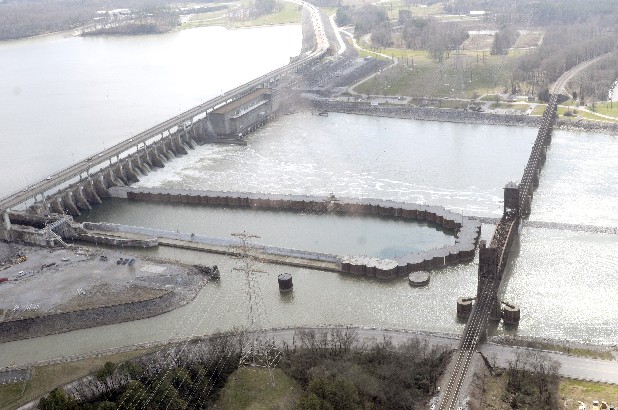Nothing illustrates this country's gummed up leadership better than the stalled Chickamauga Dam lock.
The existing lock, which TVA built and opened in 1940, is suffering from "concrete growth" due to a chemical reaction in its rock aggregate with river water. The crumbling lock walls inside the lock chamber could render it unsafe within the next decade.
When work began to build a new lock alongside the old one in 2006, the completion cost was estimated at $375 million over five years. By 2013, the builder -- the U.S. Army Corps of Engineers -- said $183 million had been spent already and the new completion estimate was $693 million. But, by then, the Corps had run out of building money. What the Corps had left was being spent on other, higher-priority dam repairs. The Corps said Chickamauga lock can still be completed in five years once money becomes available.
Of course, the cost of completing the lock will go up again and again as time passes. That phenomenon of time and money that we call inflation is exactly why the Corps ran out of money for the Chickamauga project in the first place. Funding was delayed and material costs increased. A mirror-image scenario played out across the nation.
Similar cost overruns on other Corps projects, combined with declining fuel tax collections during the Great Recession, left the Corps' Inland Waterways Trust Fund without enough money to complete any of its projects other than the Olmsted dam and lock project on the Ohio River.
The other revenues that fund lock and dam projects on America's waterways come from the federal treasury with taxpayer funds, allocated by Congress. Those have stopped, too -- courtesy of the red and blue political fights on Capitol Hill. Instead, we got the federal budget sequester and continuing rhetoric about deficits and budget cuts.
The nation's waterway shippers understand the value of adequately sized, safe and operating locks -- perhaps better than most government bureaucrats and politicians who are cornered in partisan paint-by-number boxes.
The barge industry is asking Congress to raise a diesel fuel tax that barge owners pay in order to double the money available for lock and dam replacement.
Meanwhile, the Obama administration has proposed implementing a user fee at locks to generate an extra $100 million a year
U.S. Sen. Lamar Alexander, R-Tenn., says a higher fuel tax could accomplish that goal without punishing small boats going through inland locks.
U.S. Rep. Chuck Fleischmann, a Chattanooga Republican who says he is working to get funding for the Chickamauga lock through the more conservative House of Representatives, backed a change in the Corps of Engineers' funding formula this year to cut the share of funds going to the Olmsted Lock from the barge-funded trust fund to free up more money for other lock projects, although it still didn't free up enough to fund work at Chickamauga.
Fleischmann has not backed a higher fuel tax, but he said he hasn't ruled out raising the tax if it funds the Chickamauga lock replacement.
Talk is not cheap. More than 10 years after the first announcement of the work, and several years since that work began and stalled, we're still going around and around. There's still no money. There's still no work happening. There are still no contractors getting paid. There's still no hedge against a looming complete closure of the river if the existing lock becomes too unsafe to use.
The only consistent and certain movement is the inexorable rise of the lock's completion cost with every tick of the clock.
Remind us again: How exactly are we taxpayers saving money by making cuts, cuts and more cuts to the agencies that maintain our infrastructure of dams, locks, highways, bridges, schools and weather research equipment?
How exactly are our wallets profiting by allowing, even demanding, that our representatives put off tax increases when for some necessities like this one, the need is clear and users -- taxpayers in the shipping industry -- are begging to pay more now to save more later?
The 74-year-old Chickamauga lock is just one example of our reckless disregard for crucial public assets.
And time is not on our side.

